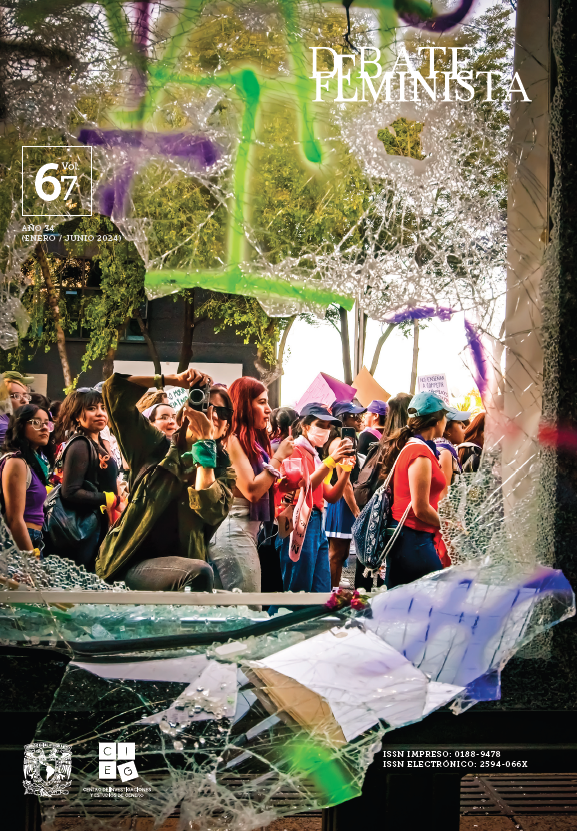Ghosteo epistémico: el borramiento del activismo feminista a través de su institucionalización y mercantilización en el activismo menstrual argentino
Contenido principal del artículo
Resumen
En este artículo proponemos el concepto de ghosteo epistémico para dar cuenta de los problemas surgidos en la articulación entre la campaña de activismo menstrual #MenstruAcción, el Estado y las empresas que comercializan productos de gestión menstrual en Argentina. La hipótesis que buscamos probar es que esta articulación no fue lo suficientemente virtuosa como para reconocer y aprovechar plenamente el conocimiento que las activistas desarrollaron en el marco de la campaña en beneficio de la población menstruante, ni para resguardar su carácter emancipatorio. En el artículo se define el fenómeno del ghosteo epistémico como la apropiación del conocimiento y el discurso simbólico producidos por el activismo y su posterior borramiento, y se lo muestra funcionando tanto en la institucionalización como en la mercantilización del activismo menstrual argentino. El propósito final es que el concepto pueda ser reapropiado en otros contextos para su detección y solución.
Descargas
Detalles del artículo

Esta obra está bajo una licencia internacional Creative Commons Atribución-NoComercial-SinDerivadas 4.0.
Esta es una publicación bajo la licencia Creative Commons Attribution-Non Commercial-No Derivatives 4.0 International (CC BY-NC- ND 4.0). Para mayor información sobre el uso no comercial de los contenidos que aquí aparecen, favor de consultar http://creativecommons.org/licenses/by-nc-nd/4.0/
Citas
Bobel, Chris y Breanne Fahs. 2020. “The Messy Politics of Menstrual Activism”, en Chris Bobel, Breanne Fhas, Katie Ann Hasson, Inga T. Winkler, Elizabeth Arveda Kissling y Tomi-Ann Roberts (eds.), The Palgrave Handbook of Critical Menstruation Studies, Singapur, Palgrave Macmillan, pp. 1001-1018. https://doi.org/10.1007/978-981-15-0614-7_71
Canosa, Viviana. 2020, 17 de diciembre. “Se viene el Ministerio de la Menstruación, obvio con nuestros impuestos”. Disponible en <https://www.infobae.com/opinion/2020/12/17/se-viene-el-ministerio-de-la-menstruacion-obvio-con-nuestros-impuestos>.
Cambridge University Press. (s/f). Ghosting, en Cambridge Dictionary. Disponible en <https://dictionary.cambridge.org/dictionary/english/ghosting>.
Charlesworth, Dacia. 2001. “Paradoxical Constructions of Self: Educating Young Women About Menstruation”, Women and Language, vol. 24, núm. 2, pp. 13-20.
Crerar, Charlie. 2016. “Taboo, Hermeneutical Injustice, and Expressively Free Environments”, Episteme, vol. 13, núm. 2, pp. 195-207.
Ding, Ning, Stuart Batterman y Sung Kyun Park. 2020. “Exposure to Volatile Organic Compounds and Use of Feminine Hygiene Products Among Reproductive-Aged Women in the United States”, Journal of Women’s Health, vol. 29, núm. 1, pp. 65-73.
EcoFeminita. 2022, 28 de mayo. “Plenario de gestión menstrual” [archivo de video]. YouTube. https://www.youtube.com/watch?v=uekStB_y9jU
EcoFeminita. 2019a. “MenstruAcción”, EcoFeminita. Disponible en <https://ecofeminita.com/menstruaccion/>.
EcoFeminita. 2019b. “Sangre, sudor y gastos: ¿por qué la menstruación es un factor de desigualdad?”, EcoFeminita. Disponible en <https://ecofeminita.com/sangre-sudor-y-gastos-por-que-la-menstruacion-es-un-factor-de-desigualdad-2/>
Ecofeminita. 2019c. “ESImportante hablar de menstruación”, EcoFeminita. Disponible en <https://ecofeminita.com/esimportante-hablar-de-menstruacion-material-educativo/?v=5b61a1b298a0>
EcoFeminita. 2021. “MenstruAcción. Información para legisladores”, EcoFeminita. Disponible en <https://ecofeminita.com/wp-content/uploads/2021/09/MenstruAccio%CC%81n_InfoparaLegisladores.pdf>
Fahs, Breanne. 2015. “The Body in Revolt: The Impact and Legacy of Second Wave Corporeal Embodiment”, Journal of Social Issues, vol. 71, núm. 2, pp. 386-401.
Felitti, Karina. 2017. “Cíclica y la copa menstrual argentina. Historia, propuestas y desafíos del movimiento Maggacup”, RevIISE - Revista de Ciencias Sociales y Humanas, vol. 10, núm. 10, pp. 37-50.
Felitti, Karina. 2019. “Es amor lo que sangra: ansiedades sociales, activismos y nuevas subjetividades en torno al ciclo menstrual”, Encartes, vol. 4, pp. 284-289. https://doi.org/10.29340/en.v2n4.55
Freedman, Gili, Darcey Powell, Benjamin Le y Kipling D. Williams. 2019. “Ghosting and Destiny: Implicit Theories of Relationships Predict Beliefs About Ghosting”, Journal of Social and Personal Relationships, vol. 36, núm. 3, pp. 905-924.
Fricker, Miranda. 2007. Epistemic Injustice, Oxford, Oxford University Press.
Gao, Chong-Jing y Kurunthachalam Kannan. 2020. “Phthalates, Bisphenols, Parabens, and Triclocarban in Feminine Hygiene Products from The United States and Their Implications for Human Exposure”, Environment International, vol. 136, pp. 105-465.
Goldman, Robert, Deborah Heath y Sharon L. Smith. 1991. “Commodity Feminism”, Critical Studies in Mass Communication, vol. 8, núm. 3, pp. 333-51.
GynePUNK. 2017, 16 de marzo. “How To Do a Menstrual Extract”. Disponible en <https://we.riseup.net/gynepunklab/how-to-do-a-menstrual-extract>.
Hennegan, Julie, Alexandra Shannon, Jennifer Rubli, Kellogg Schwab y G. J. Melendez-Torres. 2019. “Women’s and Girls’ Experiences of Menstruation in Low- and Middle-Income Countries: A Systematic Review and Qualitative Metasynthesis”, PLoS Med, vol. 16, núm. 5. https://doi.org/10.1371/journal.pmed.1002803
Holst, Anna Sofie, Constanza Jacques-Aviñó, Anna Berenguera, Diana Pinzón-Sanabria, Carme Valls-Llobet, Jordina Munrós-Feliu, Cristina Martínez-Bueno, Tomás López-Jiménez, Ma. Mercedes Vicente-Hernández y Laura Medina-Perucha. 2022. “Experiences of Menstrual Inequity and Menstrual Health Among Women and People Who Menstruate in the Barcelona Area (Spain): A Qualitative Study”, Reproductive Health, vol. 19, núm.1, p. 45.
Houppert, Karen. 1999. The Curse: Confronting the Last Unmentionable Taboo: Menstruation, Nueva York, Farrar Straus and Giroux.
Johnson, Thomas M. 1987. “Premenstrual Syndrome as a Western Culture-Specific Disorder”, Culture, Medicine and Psychiatry, vol. 11, núm. 3, pp. 337-356.
Kidd, Ian James y Havi Carel. 2017. “Epistemic Injustice and Illness”, Journal of Applied Philosophy, vol. 34, núm. 2, pp. 172-190. https://doi.org/10.1111/japp.12172
LeFebvre, Leah. 2017. “Ghosting as a Relationship Dissolution Strategy in the Technological Age”, en Narissra Punyanunt-Carter y Jason Wrench (comps.), The Impact of Social Media in Modern Romantic Relationships, J. S. Lexington Books, pp. 219-236.
Medina, José. 2013. The Epistemology of Resistance: Gender and Racial Oppression, Epistemic Injustice, and Resistant Imaginations, Oxford y Nueva York, Oxford University Press.
Medina, José. 2021. “Injusticia epistémica y activismo epistémico en las protestas sociales feministas”, Revista Latinoamericana de Filosofía Política, vol. 10, núm. 8, pp. 227-250.
Mileo, Agostina. 2017. “#MenstruAcción en el mundo: construyendo un feminismo del 99%”, EcoFeminita. Disponible en <https://ecofeminita.com/menstruaccion-en-el-mundo-construyendo-un-feminismo-del-99-2/>
Ministerio de Economía y Jefatura de Gabinete de Ministros de la República Argentina. 2021. Justicia menstrual. Igualdad de géneros y gestión menstrual sostenible. Ministerio de Economía y Jefatura de Gabinete de Ministros de la República Argentina. Disponible en <https://www.argentina.gob.ar/sites/default/files/justicia_menstrual_version_digital.pdf>
Navarro, Raúl, Elisa Larrañaga, Santiago Yubero y Beatriz Víllora. 2020. “Psychological Correlates of Ghosting and Breadcrumbing Experiences: A Preliminary Study among Adults”, International Journal of Environmental Research and Public Health, vol. 17, núm. 3, p. 1116.
Nicole, Wendee. 2014. “A Question for Women’s Health: Chemicals in Feminine Hygiene Products and Personal Lubricants”, Environmental Health Perspectives, vol. 122, núm. 3, pp. A70-A75.
Powell, Darcey N., Gili Freedman, Kipling D. Williams, Benjamin Le, y Hayley Green. 2021. “A Multi-Study Examination of Attachment and Implicit Theories of Relationships in Ghosting Experiences”, Journal of Social and Personal Relationships, vol. 38, núm. 7, pp. 2225–2248.
Repo, Jemima. 2020. “Feminist Commodity Activism: The New Political Economy of Feminist Protest”, International Political Sociology, vol. 0, pp. 1-18.
Senado Argentina. 2022, 1 de junio. “Agostina Mileo. Jornada gestión menstrual 01-06-22” [archivo de video]. YouTube. https://www.youtube.com/watch?v=waWortqKJmg
Serret-Montoya, Juana, Miguel A. Villasís-Keever, María O. Mendoza-Rojas, Flor Granados-Canseco, Eira A. Zúñiga-Partida y Jessie N. Zurita-Cruz. 2020. “Factors that Impact on the Perception of Menstruation Among Female Adolescents”, Archivos Argentinos de Pediatría, vol. 118, núm. 2, pp. e126-e134.
Stubbs, Margaret L. 2008. “Cultural Perceptions and Practices Around Menarche and Adolescent Menstruation in the United States”, Annals of the New York Academy of Science, vol. 1135, pp. 58-66.
Stubbs, Margaret y Daryl Costos. 2004. “Negative Attitudes Toward Menstruation”, Women & Therapy, vol. 27, pp. 37-54.
Tuana, Nancy. 2006. “The Speculum of Ignorance: The Women’s Health Movement and Epistemologies of Ignorance”, Hypatia, vol. 21, núm. 3, pp. 1-19.
Weiss-Wolf, Jennifer. 2017. Periods Gone Public: Taking a Stand for Menstrual Equity, Nueva York, Skyhorse Publishing Inc.
Wilson, Emily, Jacquelyn Haver, Belen Torondel, Jennifer Rubli y Bethany A. Caruso. 2018. “Dismantling Menstrual Taboos to Overcome Gender Inequality”, The Lancet Child & Adolescent Health, vol. 2, núm. 8, p. e17.
Zak, Mayra y Amalia Arias Gozurreta. 2017. “¿Cuánto cuesta menstruar?”, EcoFeminita. Disponible en <https://ecofeminita.com/cuanto-cuesta-menstruar/>







